New York City, July 2, 2014

★★★★ Haze stained the horizon. A man in a sportshirt sat on a bench with a newspaper in his lap, chin on his chest, apparently dozing. The garbage smell of Prince Street was stronger than ever. Storms were closing in, but as thunder rumbled in the late-afternoon, the menace still seemed theoretical. The west was gray, the east blue, the sky in between unsettled. By Columbus Circle, the light coming down the station stairs was dusk-blue, two and a half hours early. At 72nd Street, it was dark and raining hard, but not too hard to walk through without an umbrella. A pedestrian went sprinting across oncoming traffic, unnecessarily unwilling to wait for the signal. The rain abated to scattered drops, just long enough for the walk home from the store, then came splashing down harder than before. Whitish clouds were moving underneath the inky ones. Lighting flashed again and again. The seven-year-old, counting the interval between light and sound, estimated it was a fifth of a mile off. The show continued all through dinner: starkly defined lightning bolts, an amplified snare-drum roll of thunder, the downpour in the dark. And then, from behind the silhouetted apartment towers, a fiery yellow glow appeared. It spread up the western sky, dispelling the premature night, a sunrise in reverse. Photographs of the sky’s colors are always disappointing and inaccurate, and there was no sense even trying now. Everything was in that lambent, elusive register. The lemon yellow went to an orange-chased purple, through improbable intermediate stages, as it gradually stopped spreading. Time flowed its usual way again; the bright fraction of the sky got smaller and more intensely orange. Still there were white slashes of lightning above it.
A Novel for the End of the (Publishing) World
by Rumaan Alam

Edan Lepucki’s novel, California, will launch next week as one of the most pre-ordered debuts in the history of the publisher Little, Brown. It has become, in recent weeks, an unintentional emblem of the war that Amazon is currently waging on Little, Brown’s parent company, Hachette, as the focus of a campaign by Stephen Colbert to “not lick [Amazon’s] monopoly boot” by pre-ordering it from independent bookstores. In some ways, it’s a fitting choice, since it tells the story of a couple, Frida and Cal, making their way in the world after the collapse of society as we know it. But it’s about much more — love, marriage, terrorism, power, and parenthood.
Lepucki and I knew one another as college students, and we spoke at length about the weirdness of the publishing business, the gender politics of balancing life with being a writer, the burdens of genre fiction, envy, and more.
Marketing has to simplify something so the audience can make a snap judgment. California is a book about the end of the world, yes, but it also isn’t — it’s about family and romance and sex and domestic relationships. Have you found that discomforting, to see the book be, of necessity, turned into a product?
I would say yes and no. I think any kind of book that you write and get published is such a mindfuck. My book took three years to write, I wrote all of it alone in a room, and then suddenly people I don’t know are reading it, it has a cover. That the book becomes something consumed in any regard is both thrilling and totally terrifying to me. At this point I’m so used to the way that the book has been packaged that it doesn’t really bother me anymore — not that it’s ever bothered me, but it doesn’t have the same effect on me as it did at first, this idea of a book as a product versus a book as a world that you were living with for so long.
I was telling a friend about feeling so weird about doing publicity, and feeling it’s like you said — everything sort of distilled into one or two sentences which do not really capture the book itself. And she said to me, “You need that to find readers, and then the readers open up the book again.” Like the book becomes a world once more, as it was for the writer, as soon as they start reading it. That made me feel a lot better and I kind of, I was at peace with it at that point. But writing fiction and publicizing fiction — they’re so at odds with one another.
How do you mean?
When you’re writing something, you don’t want to get in your mind like, “What should the jacket copy for this book be? Or what would the cover be? Who would we ask to blurb this one?” When you’re working on a book, I feel like you only want limitless possibilities. You don’t want to think about the outside world.
In California you use this idea that exists so much in the popular culture — of the end of the world — while bending it into a more literary shape. Did that scare you, did that freak you out, were you like, “I’m not a genre writer?”
It’s funny when people ask me questions that suggest that I actually knew what I was doing at any point in the process, which I didn’t. When I started the book, I was aware that there are books about the future, and that are “post-apocalyptic,” but they weren’t really a presence in my writing process.
As the book came along, I made a conscious decision to not read any books that were in the same genre, because I was afraid that I would then become a copycat rather than following my own instincts. One of my favorite books is The Handmaid’s Tale by Margaret Atwood, but that’s probably the extent of my knowledge of the post-apocalyptic genre; that doesn’t really count as post-apocalyptic, but it’s dystopian I suppose.
I actually think I benefited from the fact that the books that I read and love are usually books just about people, literary fiction that isn’t really premise-oriented. I think that gave me some freedom. When I sold the novel the contract said “suspense novel” and I was totally surprised.
Using the term genre is often coded way of saying a book is stupid, or for a stupid reader. California made me think of The Secret History; a literary book that happens to be a ripping yarn. I don’t know at what point those two became at odds with one another. Why is your book called California?
It was originally called Land, as in the verb and the noun. But I knew all along that that was a very uninteresting title. My agent sent all these different words and phrases from my book, and California was one of them and I immediately loved it.
For me, it has multiple meanings. One, they never say where they are, and so I sort of love the idea of a book being the name of the place where they are, even though in the books themselves they don’t say where they are. Cal is the husband and sometimes people called him “California” in college, which was sort of an idyllic time for him. And overall there’s the sense of like this place that they used to know and used to inhabit, that way for freedom and childhood.
So I love that resonance. And then, I feel like California is the first for a lot of things. I know New York, blah, blah — but we have cool fashion, avocado on sandwiches, and of course the end of the world will occur in California, I’m pretty sure.
We have this idea of the writer as like the lone genius, which may be true, but the writer has to give her work to a corporation and an editor and an agent and all these other people are involved in the making of this product. Even down to choosing its title.
I don’t think I’m a lone genius. I’m extremely grateful, one, that they paid me money for something that I did, basically would do again for free, that I was doing for free forever, and that they were so passionate about the book. And every discussion that we had I was included. And so even the cover, my editor and I talked about images that we liked. I felt like I was part of the conversation. I remember when I got my first editorial letter, it was like ten pages long, single-spaced. And I had a little bit of a freak out. But it wasn’t so much like, “This corporation is trying to like make my book into something it’s not.” It’s more that I had been running classes and workshops for years since graduation from Iowa, but I actually hadn’t done workshops since 2006. So it was a good seven years that someone actually had like laid down the law with me.
It also helped that when I sold the book I talked to a couple editors and they all had pretty much the same suggestions. They’re all extremely sharp, smart readers and so I never really felt like they were like, “Well let’s make it more like this so we can make a lot of money.” It felt more like a workshop discussion rather than a marketplace discussion. And I think that a lot of times those can be in concert, they don’t necessarily have to be at odds with each other.
I think of Jonathan Franzen, when The Corrections was picked for Oprah’s book club and part of what he said was his concern was having Oprah’s logo on the jacket of the book. But the FSG logo is on the cover too. If your book is so precious to you, then you should just take it to Kinko’s and have it printed and hand it out on the street corner.
People always make fun of Oprah, but she picks a lot of terrific books. I think it’s the idea that a lot of women are reading a single book that makes people uncomfortable, because they feel like that means it’s a stupid book. That idea like, “Oh, my mom read it.” Well you know what? I’m a mom and I take offense at that. Like yeah, a woman who has children isn’t an idiot. So I feel like it’s definitely a gender discussion.
I want to ask you this question, though I ask myself if I would ask a man the same question. I hope I would. You wrote this book for three years, you have a three-year-old son, how on Earth do you balance those?
I wrote half of the book before he was born. I found pregnancy helped me with deadlines. It was like, “I have to get this number of pages done before I give birth.” We had free childcare from my mom the first year of his life, and I had a babysitter that I paid. So I had like 12 or 15 hours a week, as soon as he was like six weeks old. And I was able to write at my neighbor’s apartment, which was just a godsend. So I could write for two hours, come back in, nurse my son, go back and do my work.
Raising a child, making sure you raise a human being who’s not a total jerk, is very difficult and an important, significant task. But the day-to-day raising of a child is so mundane to me. I just don’t think that I could be that kind of mom, maybe because I already have another task that I want to do every day, which is writing books.
So I really struggle with it, because some women take their kid to daycare and they’ll say, “Oh, if I could stay home I would.” But the truth is that I love to work. I really like it.
Do you feel like that weighs on you differently because you’re a woman?
I don’t know, probably. Nobody ever faults a man for going back to work after their kid is born.
I guess it’s vindicating to have actually sold a book. Let’s say you had some friend or some fellow daycare mom who was like, “Oh, I can’t believe Edan uses daycare and then she just goes and sits at her computer all day. How lucky for her.” To actually then be able to say, “I got a paycheck,” really changes the nature of that conversation, fairly or unfairly.
Why not? Why can’t a kid go off and be with other children for some of the
day every day? Like why do we have to make money in order to make that be okay?
Maybe I ask about this because the book is very concerned with parenthood and childhood. A key point is this question of whether or not it’s ethical or moral to have children, given what’s happened in the world. But what is the subject of the book, in your estimation?
I think marriage is what the book is about to me. But I would also say in concert with that, there is this question of parenthood because obviously I was either wanting to be pregnant, pregnant, or had a new baby when I was writing the book. So that was obviously on my mind. There are things that are really reprehensible in the book, but I don’t necessarily think the idea of not having any children is a horrible idea. Because that makes a lot of rational sense in the world that they’re in.
I remember that soon after I had given birth all I really wanted was to be a child again. When you haven’t slept in 24 hours, that desire just to have someone tuck you in felt very real to me.
The book to me was sort unrelentingly dark for a long time, and then it ends sort of remarkably optimistically.
Interesting. Some people think it’s like a horrible, dark, dark ending.
I felt like it was a very uplifting ending. I felt better anyway.
I had a vision of the very end. That image came to me way before. I’m really interested in the way that, when people have children, they become different in their motivations. So you might give up certain freedoms in order to be safe with the child.
If you strip away the metaphor of dystopia then what you’re offering is a very dark view of marriage and relationships.
I really don’t know. You should ask a book club what they think.
Every generation always feels like it’s the last. Do you truly think we’re fucked, or were you just telling a great story?
I feel it both ways. I remember when I was just pregnant and nobody knew and I went to a book club about the book Freedom, and in that book there’s talk of being childless by choice and overpopulation. I remember going on this rant about how we were so fucked, and this makes total sense. And one woman said, “You obviously aren’t having children.” I was pregnant at the time but I couldn’t say anything.
We don’t know if we’re going to have another child for various reasons. But sometimes we’re like, “Should we have another child? Maybe he needs someone to cuddle when there’s really no oil and it’s going to be horrible, and they need to be together.” We actually go there, because I think that’s a very real possibility. Sometimes there’s another part of me that thinks, “A lot of beautiful, wonderful things have happened in the last hundred years so we could maybe get it together.” But for instance, I do think the energy crisis is going to be an even more real horrifying thing in the next hundred years. I rehearse those fantasies and nightmares like everyone else. But I think, like you said, every generation thinks they’re coming to the end.
Having a kid is just a way of shoring up against the future anyway.
True.
Maybe no one would ask you these questions if you were a dude. The idea of the missing child or the child in peril exists in the book as like a sort of primal fear but it largely happens off of the page.
Yeah, and I will be the first to say that I think the book could have been much darker.
God, I don’t know dude. I don’t know if you could have read it if it were. What are you writing now?
I have like 150 pages of a new novel that takes place in our contemporary time. It’s about women, that’s all I’ll say.
Do you feel a need to do something really different?
I felt like California was really different. It felt unlike me in some ways because of the subject, even though the tone and I suppose the language was the same. So actually going back to this new book I’m writing, it’s more in line with my novella in terms of tone and humor.
Did spending $50,000 or whatever on a graduate degree feel worth it to you in the balance of it?
I went to Iowa for free, and I urge everyone to go to graduate school for as much funding as they can possibly get. I feel like I got a great education. I always say it’s not a lucrative business, or it can be but you don’t know if it’s going to be, so don’t tie your writing to money. If you can, try not to. I’m really glad I went to Iowa for a number of reasons. I feel like I did learn a lot, I also went when I was 24 and I wasn’t a bad writer but I was really inexperienced. Thinking about my writing life now, my practice of writing, and all that kind of stuff since then, I hardly wrote at all when I went there. And I had hardly written any stories, I had written maybe three stories in two year, and I just didn’t know a lot of stuff.
But that was also only two years and that’s a short time in the life of a writer. I graduated in 2006, so it will be ten years that I entered Iowa this September so that just feels like so long ago. I’ve written a novella and I wrote a novel that didn’t sell, and California. Even though I did learn a lot, all of my novel writing happened after Iowa. So everything I’ve learned about novel writing, I’ve learned from teaching other novelists. The conversations that I have with my novel students continually teach me about the form.
Let’s talk about envy. My response when I heard about your book was envy. Then, I read it, and I really liked it, and it made me feel, strangely, better. But I always feel so jealous of other writers.
Yeah, for sure. It’s kind of like how people who are trying to get pregnant can’t stand pregnant people, or going to baby showers. There was a time I kept seeing all these bios and I’d say, “This person went to Iowa after me?” And I would just get so annoyed and I would just throw whatever across the room.
But I didn’t know them, and I knew that it was a totally petty feeling, so I didn’t really give into it too much. I recognize that that’s completely human to feel that way.
I’m not too hard on myself. In one episode of Louie, Louis C.K said something like, “You know you’re in love when you can be racist.” It’s sort of like that, like you have a designated person where you can be like, “I don’t like this person because they got what I wanted.” And it doesn’t leave your bedroom or kitchen, and it doesn’t mean you actually feel it, it’s just sort of like an ugly human thing. But I always try to balance it with supporting people, and buying their books, and doing all those things. Because it’s like if somebody feels hateful towards me, like, hey, they can do that, but I hope they still buy my book because I love it.
I think it’s something people are scared to talk about. The cheeriness of the literary culture, I don’t know if it’s a problem or not, but it doesn’t really dovetail with what I think writers carry around inside of them.
Don’t you think that both sides are exacerbated by the Internet? Right now my Facebook is nothing but my child and “Hey, look at my book.” I don’t care. This is my time to be excited.
Of course. I don’t think you should stop.
But you just see everyone’s news all the time — you may feel bitterness privately but publicly all you see is the cheering. What do you think?
I have had to set aside my feelings of rage. I was talking to Emma [Straub] last summer about this question and she said, you just have to actually do your work. And I think that’s really true. I think Emma in particular, she takes it on the chin from a lot of people because she’s so vocal and now she’s so successful.
And she gets a lot of shit.
But I think what you can’t take away from her is the fact that she actually did the work.
One thing about Emma is that everyone thinks she’s so nice, and she is so nice, but you clearly have not had dinner with Emma because . . .
She’s a real human being. It’s easy to give into envy and it’s a lot harder to stay up until one o’clock in the morning writing.
Yeah, exactly. When I am writing, I don’t check my email even. I don’t go on the Internet at all. The only thing is me and my brain trying to shut out the noise and work.
This interview has been edited for length and clarity.
California is .
Young Thug, Freddie Gibbs and A$AP Ferg, "Old English"
It’s a hot day and the forecast is unhelpful. This is not a weekend for new music: It should probably be treated as a time to just play what you have, to listen to what keeps your temperature down, your mind soft, and your body afloat. And yet!
A Subtlety of 'A Subtlety'
by Rachel P. Kreiter
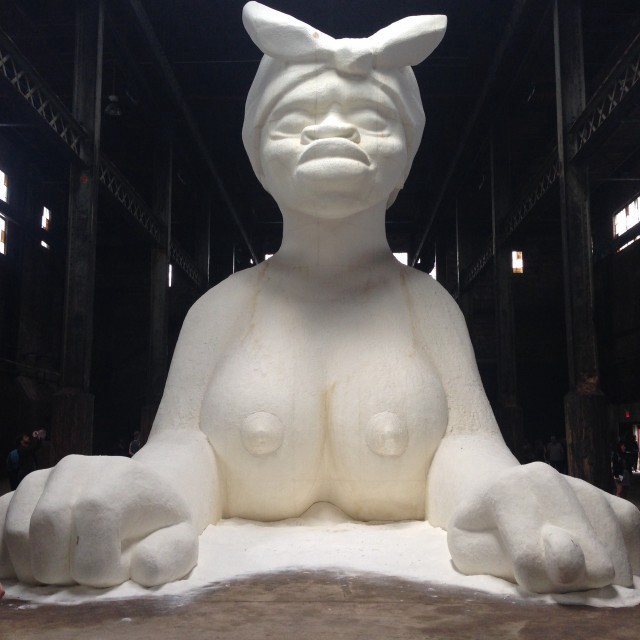
Last week, I went with a friend to see A Subtlety: or the Marvelous Sugar Baby: an Homage to the unpaid and overworked Artisans who have refined our Sweet tastes from the cane fields to the Kitchens of the New World on the Occasion of the demolition of the Domino Sugar Refining Plant, the installation by Kara Walker that will close after this weekend, following an eight-week run. When we left, I asked my friend what he thought. “Well, it’s all over Instagram,” he said. “So it’s pretty much what I expected.”
Reviews of Walker’s installation have tended to focus on a few themes: Gender and sexuality is a big one, as the work is a giant sculpture of a naked woman; many have noted the fig sign the statue makes with a thumb through its fore- and middle fingers. Others have reveled in its open-endedness: Jerry Saltz spoke to its “ambiguous anarchic meaning” while at the Los Angeles Review of Books, Francey Russell asked, “Is there a right way to view it? and concluded that, “A Subtlety can occasion moments of self-recognition and also refusals of such recognition.”
So basically, A Subtlety is whatever you think it is, person viewing A Subtlety. Mostly, though, it’s a work about race — the slavery-supported sugar industry is the primary topic of critique. Given Walker’s previous work on this theme, that is hard to miss.
What’s surprising, amid all the attention, is that A Subtlety hasn’t really been discussed as an example of Egyptianizing art; Walker is borrowing the visual language of ancient Egypt and using it in a decidedly non-Egyptian context. When employed by modern people, Egyptian aesthetics usually signify, at least subtextually, one of a handful of things we associate with Egypt: pyramids, sphinxes, and slavery. Because the Old Testament dwells upon the experience of Israelite slavery in Egypt, post-antique Westerners have long associated Egypt with despotic, autocratic, authoritarian rule, even though Egyptian slavery as depicted in Exodus is a myth. But there was a rigid social hierarchy in place, and reflected in what we call ancient Egyptian “art” is a worldview whose primary purpose was to maintain the status quo. The status quo of ancient Egypt as we understand it is a bureaucracy, at the top of which sits the king. Below him — or her, but nearly always him — is a stratified elite class. Underneath these elite people on the social hierarchy was almost every ancient Egyptian person. They weren’t slaves, but they were nearly all agrarian peasants and menial laborers.
The sorts of jobs these people did were of great fascination to the Egyptian elite, because the labor of the peasant-workers kept privileged Egyptians at the top of the social pyramid, pun intended. Egyptian literature, which was entirely composed by and for the literate elite class, often concerns entreaties to become a scribe in order to avoid potentially dangerous and body-destroying labor. Yet these activities were so essential to the foundations of Egyptian society that they were commemorated repeatedly in painted and relief wall art in tombs. From as early as the third millennium BCE, Old Kingdom-period Egyptians put small, limestone serving statues in their tombs which depicted workers doing menial yet essential labor. The idea was that the statues were magically activated and would work to produce sustenance for the deceased for eternity.
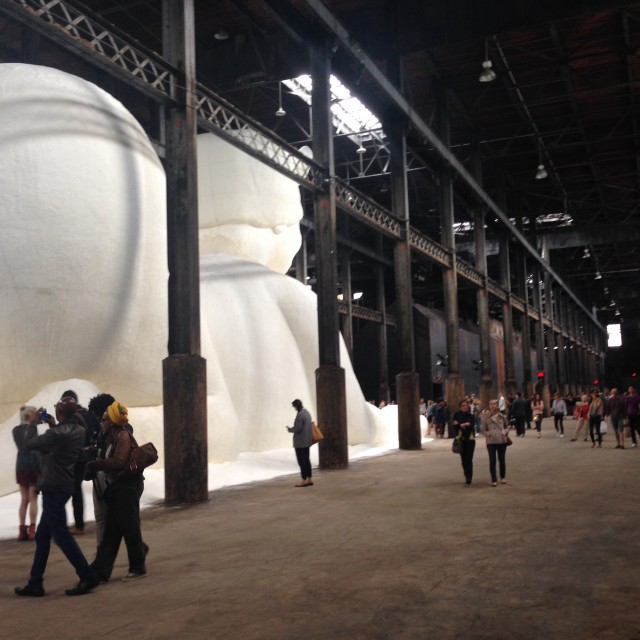
Walker has fashioned her installation in the form of a sphinx — a familiar Egyptian statue type with the head of a person and the body of a lion. In nearly every instance, a sphinx is male and royal — most often a king. And it’s true that, hunched forward, tits out, and arms in front of it, A Subtlety echoes the posture of a sphinx. But circumnavigate the thing and you’ll see that the form also, in fact, echoes a type of Old Kingdom servant statuette, a woman grinding grain. (There’s an example of this statue type in the Museum of Fine Arts in Boston.) Check out the way her body is positioned, particularly the ass and labia thrusting back, the bare chest, and the breasts presented toward the viewer. What Walker has made is something explicitly female-bodied, human, and decidedly common — a laborer. Maybe it’s accurate to say that the sugar statue has a queenly air about it, but I wonder whether that’s because the statue is meant to be regal, or whether we read monumental installations as evidence of power regardless.
I can’t say my friend was wrong though; actualizing this work, standing among the Instagrammers, didn’t add much for me. But the statue’s less immediate physical context is crucial. This factory, which is slated for demolition, is located in a post-industrial neighborhood that, since the factory’s construction, has seen all sorts of gentrification. Egyptian sphinxes were usually found in royal or otherwise high-status contexts; the Giza sphinx was built in a royal necropolis, and other sphinxes, like those of Hatshepsut, were intended for temples. Serving statues came out of private tombs, and often serdabs, constructed spaces in which images of the elite deceased were concealed for the purpose of making offerings. In that sense, the serving statues are automatically in conversation with the persons whom they’re ostensibly serving. You could say, then, that the context of Walker’s installation specifically invites a comment about the tension between the marginalizing of the working-class and those who stand to benefit from their labor. The placement of smaller molasses statues depicting children carrying baskets around the monument mirrors, in a way, the Middle Kingdom wooden serving statue type that replaced the limestone Old Kingdom example. Check out the Statue of an Offering Bearer from the tomb of Meketre, in the Metropolitan Museum; Walker’s little molasses boys are not Egyptian in the least given their naturalism, but their posture and demeanor can be found in Meketre’s serving girl. The other models and statues in the Meketre cache all concern labor, too.
Discussing A Subtlety in New York Magazine, Saltz called it “part Cecil B. DeMille parade float” — a reference to 1956’s The Ten Commandments, in which the Egyptians impose biblically framed hard labor on their Hebrew slaves, who then end up liberated from a Soviet-like, despotic Ramses the Great as portrayed by Yul Brynner, who had something of a gift for bringing totalitarian asshole kings to life. The Western view of Egypt has always tangled labor up with power, flattening the actual Egyptian social hierarchy. There’s no need to flatten Walker’s work, too; the city will take care of that soon enough.
Rachel P. Kreiter is a doctoral candidate in art history at Emory University.
A Poem by Mark Conway
by Mark Bibbins, Editor
in head stones
the sun is real but lies ::
it’s much older
than its age; by now
the excess visions
have all been booked / the best
are overused…
the river runs through dinkytown
accepting all its slops
our town fish live — celebrities –
scavenging on chemicals
and tripe / what they eat
helps them
eat up what they eat: sweet
genetic engineering;
we posit
they prefer this rise in appetite…
anymore there are
no visions / no visors needed neither nor sun screen
to block the once-
anticipated vision burn / oh
shit mon petit there
simply isn’t time:
the sun runs like honey
through the molten hive ::
it’s said
the tiny occupants can sting or
hump just once
then clatter gladly
to the floor:
the sun is real
but lies / you stop time
by simply ceasing breathing: death
is how you see behind:
the way you know someone
is back there
when that certain
someone stares
Mark Conway’s poem is from a new manuscript with the working title Fuse. Other poems have appeared or are forthcoming in The Colorado Review, Iowa Review, Ploughshares, American Poetry Review, Kenyon Review Online, the Virginia Quarterly Review and Field.
You will find more poems here. You may contact the editor at poems@theawl.com.
Man Subtle
“In long interviews at his apartment off Fordham Road in the Bronx, however, Mr. Merritt rarely contradicted himself. Court records confirmed his mastery of details. He insisted that I portray him as deeply flawed.” — The request of Earl Robert Merritt, who now claims that he framed hundreds of people for the NYPD, leading to their arrest for possessing guns or narcotics — or other crimes.
New York City, July 1, 2014

★★ A house sparrow wallowed on its side in a planter, its gray feathers fluffed and disheveled. The air was institutional plexiglass. Passengers on the platform stepped toward the doorway of a 1 train car and flinched back, feeling the lack of air conditioning. The air conditioning on the B train was working and dripping copiously into the car. Outside, a stagnant patch of shade was no better than direct sun. The heat grew thicker in the streets — nothing extraordinary, just conventionally sweltering. Nowhere was comfortable, even as the sun fell behind the buildings. On the way down Broadway to find gelato, the two-year-old was a squirmy, ever hotter and grumpier burden on the neck and shoulders. The return trip would be by subway: the trains inexplicably late, the station air stupefyingly hot. Dessert was soft in its styrofoam box after one stop.
A Woman Walks Into a Men's Rights Conference
Jessica Roy flew to Detroit to attend the International Conference on Men’s Issues, and while there was, naturally, a “palpable distaste for women,” there was something more:
But what I didn’t expect was how it would make me feel: sad and angry and helpless and determined, all at the same time. Moreover, I didn’t expect to talk to so many men in genuine need of a movement that supports them, a movement that looks completely different from the one that had fomented online and was stoked by many who spoke at this three-day conference.
And you’ll never guess what they called her.
Quiz: Can You Tell What Makes a Good Tweet? (Corrected)
The New York Times did a “how well do you know Twitter” quiz, pitting readers against a social media algorithm, and it’s a lot of fun. I’ve tried three times and I can’t break 19! But there’s one problem:
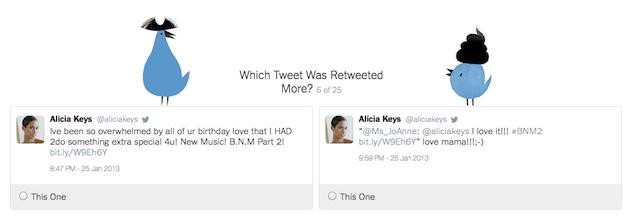
What are these garbage tweets? This isn’t the Twitter I know! This isn’t the Twitter anybody knows. Here is a new version of the quiz, corrected and adjusted for the realities of ᴛʜᴇ sᴏᴄɪᴀʟ ᴡᴇʙ. Record your answers and check them at the end!

1. Which Tweet Was Retweeted More?
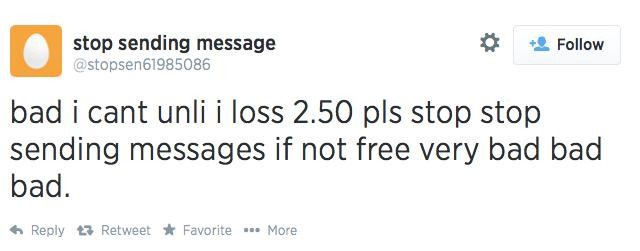


2. Which Tweet Was Retweeted More?



3. Which Tweet Was Retweeted More?



4. Which Tweet Was Retweeted More?



5. Which Tweet Was Retweeted More?



6. Which Tweet Was Retweeted More?



7. Which Tweet Was Retweeted More?
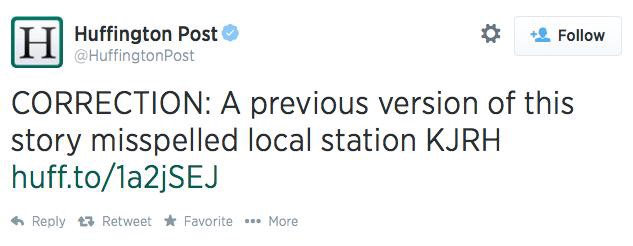
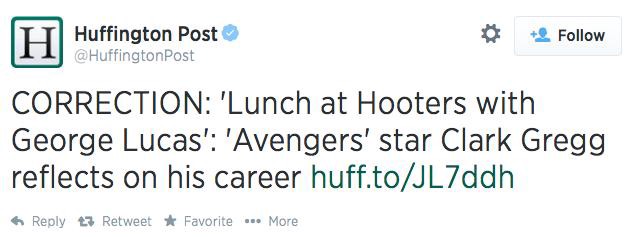

8. Which Tweet Was Retweeted More?



9. Which Tweet Was Retweeted More?



Answer key:
1. Tie
2. Tie
3. First
4. Second
5. Second
6. Tie
7. Second
8. Tie
9. First
Congratulations! You beat the algorithm if you got this far at all.
Ask Polly: I Had a Stillbirth and My Husband Totally Lacked Empathy

Dear Polly,
I think my husband is spineless, selfish, and prioritizes his convenience over my emotions.
Background: My husband is from another country. We visit for a month or so every summer, when he catches up with friends and family. I am cool with this. (I do wish he might also, I dunno, set some time aside for his *wife* during our only vacation time, but that’s another letter). However, he has this one friend whom I would actually happily feed to rodents of an unusual size.
I had a stillbirth almost five years ago. It took a year to figure out what the problem was, during which I had two more miscarriages. They diagnosed me, I got pregnant again, I was considered high-risk, and I spent the next nine months giving myself shots once or twice a day and getting ultrasounds every week or two. The next time we went to his hometown, his dickweasel friend spent a good half hour merrily lecturing me on how American women abuse the system; how healthy women in *their* country only get two ultrasounds during their entire pregnancies; and how American kids are probably all going to have brain damage.
Assuming this idiot had completely forgotten the stillbirth of one of his supposedly closest friends’ firstborn, assuming he’s too fucking stupid to do the math and think, huh, the lady I’m talking to might have some health issues that necessitate additional care, there’s the fact I’M AMERICAN, five months pregnant, and he’s assuring me my kid will be hideously damaged. I was feeling some pretty severe anxiety about the whole situation at the time. (For context, after a lifetime of avoiding psychotropic drugs, I went on anti-depressants a week after I found out I was pregnant, when my doc asked me if I was happy about the baby and I burst into tears out of sheer terror that something was going to go wrong with this one, too). So the fact that my husband sat there while his buddy went off on his little spiel, missed the fact that I was so upset that I spent the rest of the night on the porch desperately wishing I still smoked, and refused to drive me back to where we were staying so we slept at the dickweasel’s house — none of that went over well.
Nevertheless, we came home, and it eventually blew over. Our son was born, and is delightful. Two years have passed, and I’m pregnant again. My husband is planning to celebrate his 40th birthday at the dickweasel’s house (in keeping with his charming personality, the dickweasel refuses to go out anywhere during the annual get-togethers and makes people go to his place out in the boonies). I’m not going, and my husband is trying to guilt-trip me by whining about how he only sees his friends once a year.
I’ve never wanted a knight in shining armor, but I feel like my husband massively let me down by not intervening or speaking up for me after the fact, or even calling me a fucking taxi so I could get out of there. I’m usually pretty mouthy, but I was, a) out of my element in a foreign country where I don’t speak the native tongue, b) kind of in shock that anybody would be so fucking cruel and insensitive, and c) vulnerable. Just plain vulnerable and hurt. I feel like he’s compounding this every time he tries to bully me into letting it go and just making nice with his bro. I feel like he’s placing the convenience of his having a feel-good reunion over the fact that I am PREGNANT again and ANXIOUS again and the thought of having to smile at that douchebag and grit my teeth and try not to punch him/cry if he makes any further cracks on this go-round is giving me massive agita. Hence this letter. Any tips on how I can convince my husband to get his head out of his ass? I will pretty obviously not be going to this party, but I’d like to figure out a way to dredge up some shred of respect or understanding for the father of my children.
P.S. Yes, we are in counseling. No, no common ground has been found on this issue.
The Ultrasound & The Fury
Dear TU&TF;,
That sounds terrible and it couldn’t be more of a perfect storm. You have PTSD, or similar feelings of extreme anxiety and stress around the stillbirth. Women who’ve been pregnant before can ALMOST attempt to understand how deeply traumatic and horribly sad that experience might have been for you. But I’m guessing that most of us can’t touch the extreme hell of it. The physical and emotional recovery must take so long. And maybe it’s never really complete. Because when you’re pregnant again, it’s pretty easy to conjure it all up: The vulnerability, the fragility, the fear.
So first, I want to say that I feel for you and I’m so sorry that you had to experience that kind of trauma and sadness. I’m also sorry that your husband hasn’t done a good job of trying to understand and adjust to the full force of your pain and anguish — in order to show solidarity, to have your back, and to demonstrate that you’re in this building-a-family thing together.
It’s fundamentally crazy-making to be aligned with someone who doesn’t automatically jump to your side and protect you when something HE KNOWS and YOU KNOW was truly awful for you is being dredged up and treated clumsily and idiotically by an utterly clueless (and aptly named) dickweasel. It must feel almost like an out-of-body experience. Here you are, married to/intimate with this man, and he would rather shrug off what was probably the singular most traumatic event of your life? And there you are, all big and pregnant and anxious, and he’d rather chuckle along with his bro than make a gesture of solidarity? That’s the kind of moment when you feel like you must be going crazy. Like your sanity is being tested. “Wait a minute. Shouldn’t he… Am I nuts, or should he defend me on this one, no matter what? Isn’t this a little wrong? Doesn’t anyone else see the wrongness here?”
But let’s put on our empathy caps for the sake of improving this very bad situation. What compounds your problem is that your husband lives far away from his country and his family and his dickweasel bros and therefore romanticizes them a lot. He isn’t good at simultaneously grappling with your extreme trauma and his sense of loyalty to his longtime friend. This may be a simple matter of convenience and overload — feeling feelings seems much harder than just barking, “LIGHTEN UP, BABE!” and moving forward. Or, he may be plagued by his own feelings about the stillbirth — feelings he wants to shut off, and in addition to that, he may have a sense of having lost all steady connection to his home. He may feel (unfairly) that you’ve taken over his life and on those rare occasions when he can go home, he wants to do it full-on, without taking the smallest sliver of his new life and new responsibilities into account.
(I’m not implying that his behavior is okay; I’m just trying to make it easier for you to weather this perfect storm. He’s being a baby, of course. He knows exactly what’s up and he’s STILL being a dick about the whole thing. For christ’s sake, when this thing with the dickweasel happened, you hadn’t had a successful pregnancy yet. You were floored and upset and he ignored you and made you sleep in the dickweasel’s house. He should be ashamed, but instead he’s being stubborn.)
Why? Let’s assume it involves heavier stuff for him. You’re not saying, “My husband is constantly undermining my feelings.” If that were true, you’d have bigger fish to fry. I don’t doubt that it’s symbolic and representative of overarching troubles in your marriage. But there’s also something fundamental going on — some reason why he feels that yielding to you on this front would mean giving up his last shred of independence and his last tie to his bros and his homeland and his roots. We can’t help but wonder, ”Are his roots a wee bit dickweaselly?” Not clear. But somehow his pride and his sense of self and his bromantic delusion are on the line.
Still, it’s pretty fucking stupid that he’s choosing THIS battle, though, which is related to you HAVING HIS CHILDREN SUCCESSFULLY WITHOUT FALLING APART. You’re pregnant again, vulnerable, full of feelings about the stillbirth and the last traumatic bullshit visit with the dickweasel, and all you’re saying is “I can’t be around that dude in this state, BUT YOU ARE WELCOME TO LEAVE ME BEHIND ON YOUR 40TH BIRTHDAY AND GO HAVE YOUR FUN.” That alone is pretty generous of you, if you ask me. You could say, “You know what? Fuck you. I’m pregnant and fragile and we’re going to have a family birthday party with our son, and it’s definitely not going to be on this creep’s turf. You’re just going to have to accept that you have a family now and this is what a birthday looks like.”
So this is your gift to him. His bromantic birthday doesn’t have to get trampled on by the actual human being about to bear his second child. But he needs to recognize that this is a very generous gift, and stop pressuring you to go to the dickweasel’s house with him. And at the dickweasel’s house, when other people ask why you’re not there, he needs to defend your choice, because that’s what a good human being who cares about his partner’s feelings does.
Maybe, in order to thank you for this gift, your husband should consider trying very hard to finally grasp what you’ve been through — with the previous pregnancies, and this one. Maybe it’s time for him to finally recognize how these things shape your experience. And when he finally recognizes this, or at least tries to, it will make your marriage stronger and happier. So you need to ask for this, and be very specific. If you just keep saying, “YOU DON’T UNDERSTAND YOU DON’T GET IT FUCK YOU!” it won’t sound like a request. It will sound like an attack on his character. Like a way to fight him.
You don’t want to fight. You want him to conjure up his best, most honorable self. You want to remind him that he’s a good, loyal man who loves you and wants to protect you and your kids, who cares about your feelings and will defend those feelings even when it’s not all that easy to do.
Even if he doesn’t get it, he needs to take your word for it. That’s what I told my husband right after our first kid was born. He would do things with the baby that didn’t seem safe to me, and if I spoke up about it, he’d always say, in the same exasperated tone, “JUST RELAX, IT’S FINE!” He knew everything because he’d already had a kid, see? So I had to get very calm and sit him down and look him in the eye and say, “Listen. I know you feel like it’s fine. MAYBE IT IS FINE, IN FACT. But I’m having a heart attack just watching you. That’s not fine. And you have no way of really grasping how NOT FINE it feels for me. Having a baby is like lopping off your own head and handing it to someone else to take care of. My fucking cells want me to protect that thing you’re holding. I can’t help it. I can’t say, ‘Hey, cells, relax, it’s fine, he’s not going to drop my fucking head on the floor… I’m pretty sure he won’t, anyway.’”
And then I said this: “I have a RIGHT to be uptight about this fucking baby. That’s MY right. I’m going to try not to be controlling forever and ever. But right now, with a giant scar in my gut, feeling emotional, trying to make sure that baby survives? There’s no physical way that you can understand this feeling. No fucking way you can touch it. So just accept that you don’t get it, step back, and grant me this fucking right.”
I sound like a lot of fun, don’t I?
The point is, your husband needs to grant you the RIGHT to be extra sensitive and weepy and needy and intense and anxious when you’re pregnant. And maybe you need to spell it out for him. Because having a stillbirth must feel like having someone cut your head off and then smash it with a sledgehammer while you watch. I’m sorry to be so brutal. I’m just trying to put this in terms that your husband MIGHT understand, at least enough to understand that he doesn’t fucking understand. He needs to give you the benefit of the doubt and trust you on this. I don’t know the big picture for you. But right now, in your circumstances, you want your husband on your side. Pick a calm, happy moment, and tell him you need him as an ally. You need his help. You need him to respect your feelings.
The really terrible thing about being with someone who doesn’t empathize well is that 1) it makes you harder on yourself which 2) makes you harder on other people and 3) instead of seeking out more caring people on whom you might lean occasionally, you tend to preemptively write people off or globalize or overgeneralize and assume that NO ONE will empathize with you at all. These things are subconscious, mostly. What happens is, you feel isolated and sad and lonely and you struggle mightily within your marriage to explain, express yourself, and get a toehold emotionally, and one day you wake up and you realize that, instead of seeking a wider circle of support, you’ve actually been isolating yourself. Because you’re tired! And overwhelmed! And you’re angry at yourself, and sad, too. You don’t really want to expose any of your friends to all of these things. And maybe you don’t want your friends to know what a dick your husband can be sometimes.
But listen to me. I’m sorry for everything. I’m sorry you feel so vulnerable right now. I know this birthday thing is awful. Talk it out with your friends. Don’t let anyone say it’s just this thing you’re “stuck” on. But try to be calm. Try to take care of yourself. Keep going to counseling and do your best to express yourself there. Be patient with yourself and everyone else. You have to cultivate a peaceful home life right now, for your own good, no matter what’s going on with him.
Do you have female friends to lean on? If not, you need to work on that. You need a lot of support from women in your life when you’ve got a husband who struggles with empathy the way yours does. You can’t walk around angry and anxious all the time. You need to let off steam and feel supported by other people. I’ll bet that’s hard for you. Don’t stay in this angry place. Let yourself feel sad. Ask for help when you need it. And don’t do the dishes every night when you’re visiting your husband’s country. Explain that you’re trying to take it easy and stay positive and you need to be careful. Don’t try to live up to other people’s expectations of you, or battle their ideas about American women. Just be kind to them and take care of yourself.
You aren’t putting up with shit this time. You love yourself too much for that. You’re growing. You’re getting stronger. You know yourself better than you ever have. Take pride in who you are and how far you’ve come.
Do your best to make him understand. But no matter what you ask for and don’t get in this world, you always have yourself. You are smart and resilient, and you deserve to feel happy and loved. Give yourself what you need, and don’t let the dickweasels get you down.
Polly
Does your life feel like it is on hold but you want to zip through it like a DVR recording of that soccer game where America lost? Write to Polly and discuss!
Heather Havrilesky (aka Polly Esther) is The Awl’s existential advice columnist. She’s also a regular contributor to The New York Times Magazine, and is the author of the memoir Disaster Preparedness (Riverhead 2011). She blogs here about scratchy pants, personality disorders, and aged cheeses.
Photo by Ron Dunnington
